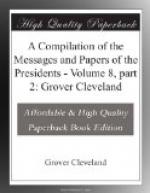To this letter also no answer appears to have been returned, and no instructions were given to our minister in London in pursuance of the request contained in it.
On the 3d day of March, 1847, Christopher Hempstead was appointed consul at Belize, and an application was then made for his exequatur through our minister in London, Mr. Bancroft. Lord Palmerston referred Mr. Bancroft’s application for an exequatur for Mr. Hempstead to the colonial office. The exequatur was granted, and Mr. Hempstead, in a letter to the Department of State bearing date the 12th day of February, 1848, a copy of which is herewith submitted, acknowledged the receipt of his exequatur from Her Britannic Majesty, by virtue of which he has discharged his consular functions. Thus far this Government has recognized the existence of a British colony at Belize, within the territory of Honduras. I have recalled the consul, and have appointed no one to supply his place.
On the 26th day of May, 1848, Mr. Hempstead represented in a letter to the Department of State that the Indians had “applied to Her Majesty’s superintendent at Belize for protection, and had desired him to take possession of the territory which they occupied and take them under his protection as British subjects;” and he added that in the event of the success of their application “the British Government would then have possession of the entire coast from Cape Conte to San Juan de Nicaragua.” In another letter, dated the 29th day of July, 1848, he wrote:
I have not a doubt but the designs of
Her Majesty’s officers here and
on the Mosquito shore are to obtain territory
on this continent.
The receipt of this letter was regularly acknowledged on the 29th day of August, 1848.
When I came into office I found the British Government in possession of the port of San Juan, which it had taken by force of arms after we had taken possession of California and while we were engaged in the negotiation of a treaty for the cession of it, and that no official remonstrance had been made by this Government against the aggression, nor any attempt to resist it. Efforts were then being made by certain private citizens of the United States to procure from the State of Nicaragua by contract the right to cut the proposed ship canal by the way of the river San Juan and the lakes of Nicaragua and Managua to Realejo, on the Pacific Ocean. A company of American citizens entered into such a contract with the State of Nicaragua.




